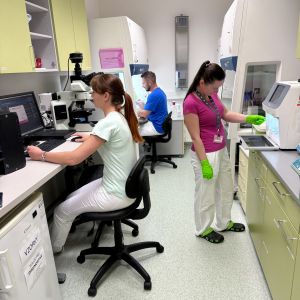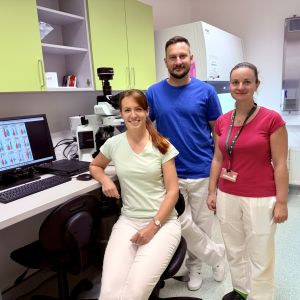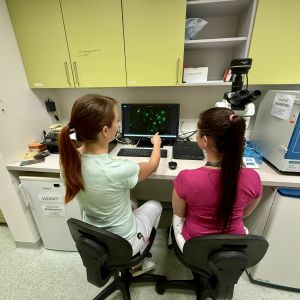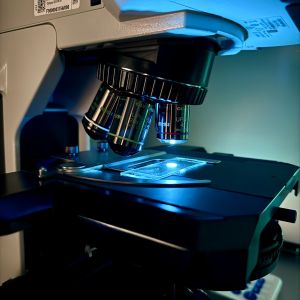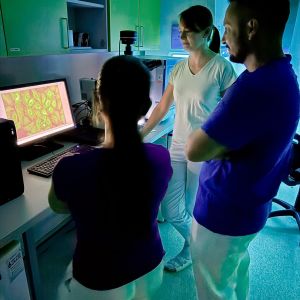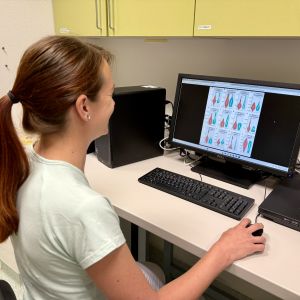South Bohemian researchers have linked science, healthcare, and technology. In a unique project, they aim to save newborns

With the intention to connect cutting-edge research, clinical practice, and modern technologies, a unique collaboration of significant institutions was established in South Bohemia. One of the concrete goals is the early identification of signs of infection that threaten prematurely born children. The Faculty of Science of the University of South Bohemia, České Budějovice Hospital, and the Biology Centre of the Czech Academy of Sciences are jointly implementing two ambitious projects: MEDDA (Medical Database) and BUDDIAG (Budweis Diagnostics) – both supported by the Jan Amos Comenius Operational Programme (OP JAK).
These projects utilize data, artificial intelligence, and an interdisciplinary approach to significantly advance diagnostics and patient care while strengthening the innovative potential of the entire region. The centerpiece of the MEDDA project is the creation of a modern data platform that will connect laboratory and clinical data and enable their efficient use in searching for new diagnostic possibilities. Specifically, it focuses on identifying early biomarkers for late-onset neonatal sepsis (LOS) – a serious infection that represents one of the greatest risks for children born before the 32nd week of pregnancy. "Artificial intelligence will help identify early sepsis biomarkers and enable doctors to make faster and more accurate decisions. The project thus responds to the acute need for data-driven care, healthcare digitalization, and effective transfer of research into practice," explains Jindřich Chmelař from the Department of Medical Biology at the Faculty of Science, University of South Bohemia.
Scientists from the Biology Centre of the Czech Academy of Sciences also specialize in developing new tools for advanced patient metabolism diagnostics. "From one drop of blood, we can simultaneously measure hundreds of substances circulating in the body. This is roughly an order of magnitude more than is usually obtained in standard clinical analyses today," says Petr Šimek from the Biology Centre of the Czech Academy of Sciences. In the BUDDIAG project, researchers are currently working on detailed analysis of metabolic processes in prematurely born children. Rapid and more accurate diagnostics will enable doctors to more effectively assess the health status of newborns and adapt treatment and nutrition to their individual needs. "We focus on the composition of fatty acids and want to substantially expand the set of biomarkers that have not been monitored so far. Thanks to this, it will then be easier to determine what condition the newborn is in and what their organism needs. When doctors correctly adjust the composition of fatty acids in nutrition, serious vision damage that these children often suffer from can be prevented, for example," adds Petr Šimek.
Obtaining a comprehensive, personalized metabolic picture of each patient represents a promising direction in disease prevention and treatment. The new diagnostic solutions that South Bohemian specialists are developing and testing at the České Budějovice hospital have significant commercial potential, and their application in the global market in the form of innovative diagnostic kits is expected.
Large amounts of information are currently collected in hospitals. According to international studies, however, only 3% of this data is effectively used. Within the care of children born before the 32nd week of pregnancy, data from laboratories and monitors are collected, and clinical data from patients are also recorded. This group of newborns has a reduced immune response and the resulting increased risk of serious infections. Through more thorough connection of all collected data, a more comprehensive view of the entire issue can be obtained. "Within the unique collaboration of the Faculty of Science of the University of South Bohemia, the Biology Centre of the Czech Academy of Sciences, and České Budějovice Hospital, a connection was made in two scientific projects, where there will be an effort to maximize the use of all obtained data for further optimization of care, prevention, early identification of infections, but also obtaining a picture of the metabolic functions of the developing organism. For these immature newborns, the aspect of the amount of blood drawn or other biological material is also important. In researching new analytical methods, this will also be taken into account so that traumatization during sampling is reduced, but also, for example, to reduce the number of transfusions administered," explains the practical significance of the projects Jiří Dušek, head of the Neonatology Department at České Budějovice Hospital.
The entire project is a unique connection of a specialized clinical workplace with scientists from many different fields of natural sciences and experts in data collection and analysis using artificial intelligence. The Faculty of Science of the University of South Bohemia leads the project both professionally and organizationally, ensures the development of the data platform, bioinformatics and laboratory analyses, and actively involves students in the project. České Budějovice Hospital, one of the largest and best-rated hospitals in the country, brings to the project primarily samples, patients, and key clinical data, clinical interpretation of analysis outputs, and their testing directly on patients. The Biology Centre of the Czech Academy of Sciences contributes cutting-edge research and method development in the field of metabolomics.
Connection with the commercial sector is helped by two private companies that are project partners – the fourth partner of the MEDDA project is the technology company Anycare s.r.o., which brings know-how in the field of digital data collection, software development, and real-time healthcare analytics to the project. The company Chromservis collaborates on the BUDDIAG project.
The goal is to immediately transfer research results into practice and subsequently begin using them in patients outside the studied group as well. This cooperation represents a pilot model of regional collaboration between research, healthcare, and technologies, which has the potential to fundamentally change not only the approach to newborn care, but also the broader concept of future medicine. The results will be applicable not only in South Bohemia, but also at national and international levels – with the ambition to become a model for future cooperation of academic, clinical, and technological institutions in the Czech Republic. At the same time, the projects significantly contribute to the development of the South Bohemian Region as a region with high innovative potential. They support the growth of qualified jobs, create an environment for excellent research, and increase the region's attractiveness for young scientists, doctors, and data specialists. They also strengthen cooperation between public institutions and the private sector, which is key for effective transfer of research results into practice. The MEDDA and BUDDIAG projects thus become a prototype of what modern healthcare based on data, cooperation, and innovations can look like.
